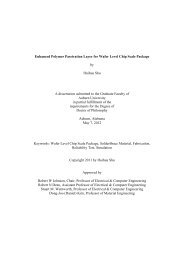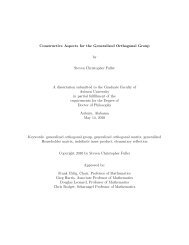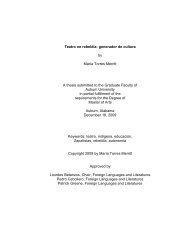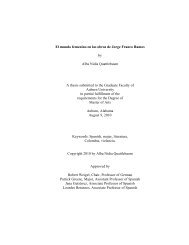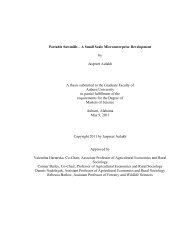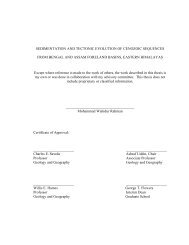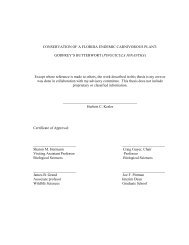the trouble with gender in othello - Auburn University Electronic ...
the trouble with gender in othello - Auburn University Electronic ...
the trouble with gender in othello - Auburn University Electronic ...
Create successful ePaper yourself
Turn your PDF publications into a flip-book with our unique Google optimized e-Paper software.
fur<strong>the</strong>r understand <strong>the</strong> subversion <strong>in</strong>herent <strong>in</strong> Desdemona’s speech, let us look at<br />
Butler’s explication of Wittig’s discussion of <strong>the</strong> use of <strong>the</strong> word “I” by a woman.<br />
A woman cannot use <strong>the</strong> first person “I” because as a woman, <strong>the</strong><br />
speaker is ‘particular’ (relative, <strong>in</strong>terested, perspectival), and <strong>the</strong><br />
<strong>in</strong>vocation of <strong>the</strong> “I” presumes <strong>the</strong> capacity to speak for and as <strong>the</strong><br />
universal human. […]This privilege to speak “I” establishes a<br />
sovereign self, a center of absolute plenitude and power; speak<strong>in</strong>g<br />
establishes ‘<strong>the</strong> supreme act of subjectivity’ This com<strong>in</strong>g <strong>in</strong>to<br />
subjectivity is <strong>the</strong> effective overthrow of sex and hence, <strong>the</strong><br />
fem<strong>in</strong><strong>in</strong>e; ‘no woman can say I <strong>with</strong>out be<strong>in</strong>g for herself a total<br />
subject—that is un<strong>gender</strong>ed, universal, whole’ (Butler 117)<br />
Desdemona, seem<strong>in</strong>gly <strong>with</strong>out fear or apology, claims <strong>the</strong> privilege to speak ‘I’<br />
<strong>in</strong> this speech. Not only does she <strong>with</strong> her first l<strong>in</strong>e of speech change her fa<strong>the</strong>r<br />
from a subject, one who claims “my daughter” repeatedly, to an object, “my<br />
fa<strong>the</strong>r”, but <strong>with</strong> <strong>the</strong> second l<strong>in</strong>e she takes for herself full subjectivity; “effectively<br />
overthrow(<strong>in</strong>g)” her <strong>gender</strong>. This is, of course, a complete subversion of her<br />
<strong>gender</strong> performance.<br />
This is only <strong>the</strong> beg<strong>in</strong>n<strong>in</strong>g of Desdemona’s <strong>in</strong>sistence upon be<strong>in</strong>g<br />
perceived as a subject, not just an object of possession, <strong>in</strong> Act I. When it is<br />
mandated that O<strong>the</strong>llo must go to Cyprus, <strong>the</strong> Duke proposes that Desdemona<br />
should return home <strong>with</strong> her fa<strong>the</strong>r. Both Brabantio and O<strong>the</strong>llo dismiss this<br />
12







